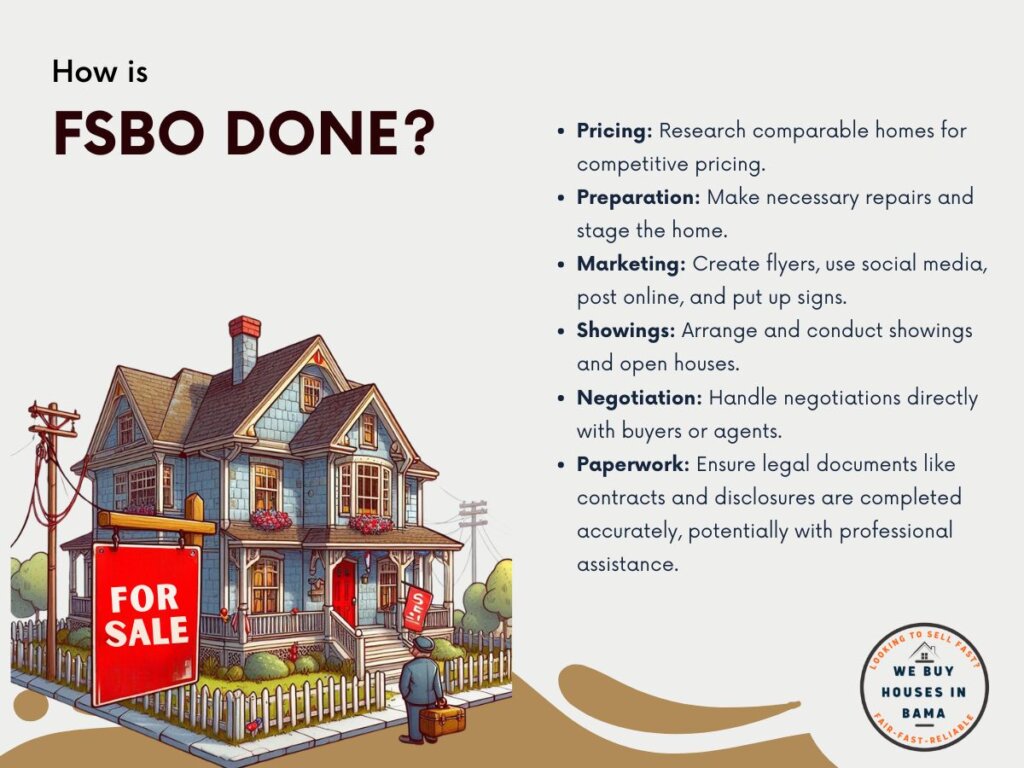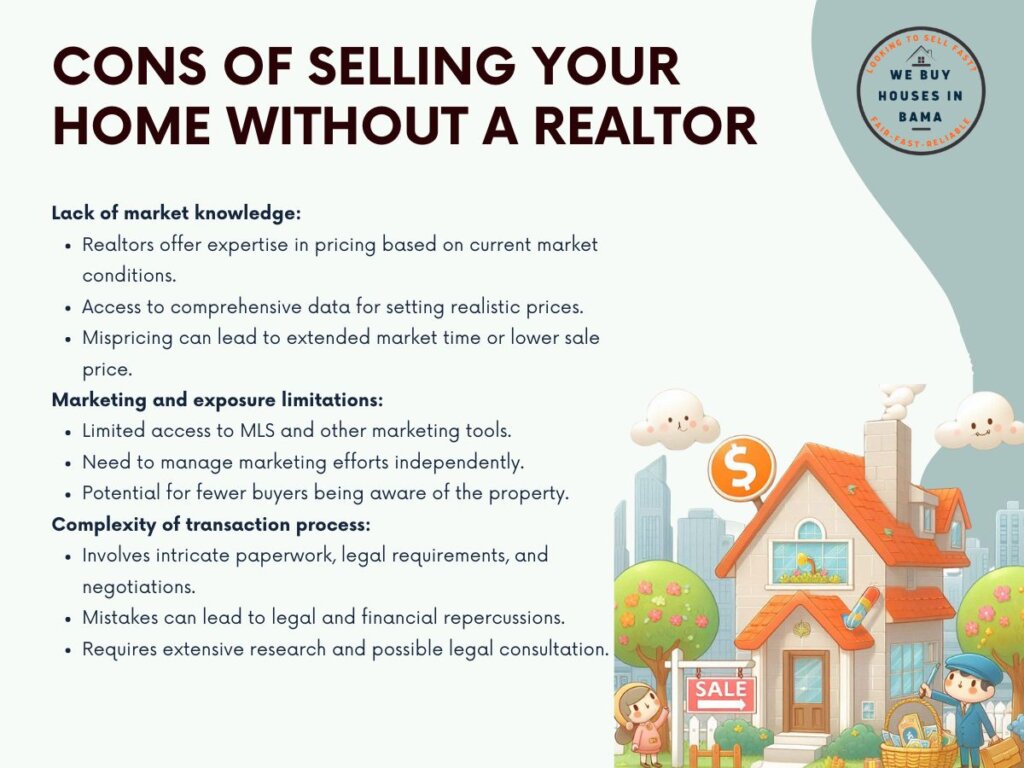Selling a home is often one of the most significant financial transactions in a person’s life, filled with complex decisions and extensive paperwork. Typically, homeowners rely on real estate agents to guide them through this daunting process, benefiting from their expertise in market dynamics, negotiation, and legal compliance.
However, some homeowners opt to take a different route by selling their property without a realtor, known as For Sale By Owner (FSBO). This approach can offer several advantages, including potentially saving on hefty commission fees, but it also comes with its unique set of challenges.
Choosing to sell a home without the aid of a realtor requires a deep dive into the intricacies of the real estate market, a good grasp of marketing strategies, and the confidence to negotiate directly with buyers and their agents. It appeals particularly to those with real estate experience or the necessary time and resources to dedicate to the selling process.
What is For Sale By Owner (FSBO)?
For Sale By Owner (FSBO) refers to the method of selling real estate without the assistance of a real estate agent or broker. Homeowners who choose this option handle all aspects of the marketing and sale of their property themselves.
This approach can save on the commission fees that would typically be paid to a real estate agent, which are generally about 5% to 6% of the home’s selling price.
How is FSBO Done?
Selling a home FSBO involves several key steps:

- Pricing the Home: Homeowners need to determine the right price for their home. This often requires researching comparable homes in the area to ensure the price is competitive and realistic.
- Preparing the Home for Sale: This includes making any necessary repairs and improvements to make the property more appealing. Homeowners also typically stage the home to make it look its best for potential buyers.
- Marketing the Home: Homeowners must take charge of marketing their property. This can include creating and distributing flyers, using social media, posting online on various real estate platforms, and putting up a “For Sale By Owner” sign in the yard.
- Showing the Home: The homeowner is responsible for arranging and conducting showings and open houses to potential buyers.
- Negotiating the Sale: FSBO sellers handle all negotiations directly with buyers or their agents, discussing terms and reaching an agreement.
- Handling the Paperwork: The seller must ensure all legal paperwork, including contracts, disclosures, and closing documents, is correctly completed. This often requires consulting with a real estate attorney or a professional to ensure compliance with local real estate laws.
How Does FSBO Differ from Selling with a Realtor but Without the MLS?
Selling a home with the help of a realtor but without listing it on the Multiple Listing Service (MLS) is known as a pocket listing or off-market listing. Here’s how it differs from FSBO:
- Realtor Involvement: In a pocket listing, a realtor is still involved in handling aspects of the sale, including pricing, negotiation, and paperwork. In contrast, FSBO sellers do all of this themselves.
- Market Exposure: FSBO homes are often marketed by the owner through various means, and they may choose to list their property on MLS or consumer websites that allow FSBO listings. Pocket listings do not appear on the MLS but rely on the realtor’s network and other marketing methods to find buyers, which can limit market exposure compared to traditional listings that appear on the MLS.
- Control and Privacy: FSBO sellers have complete control over the sale process and maintain privacy by handling all inquiries themselves. In a pocket listing, the realtor controls most of the process but might keep the sale more private than it would be on the MLS.
In both cases, the common theme is the exclusion from the MLS, which can affect the visibility of the property to potential buyers. However, FSBO offers complete control and potential cost savings, while pocket listings benefit from professional expertise but with limited exposure.
Pros of Selling Your Home Without a Realtor
Choosing to sell your home without a realtor can be a daunting task, but it comes with several potential benefits that can make the challenge worthwhile. Homeowners who opt for the For Sale By Owner (FSBO) route often do so to maintain more control over the sale process, avoid high commission fees, and have direct interaction with potential buyers.
1. Cost Savings
One of the most compelling reasons to sell your home without a realtor is the potential for significant cost savings. Typically, realtor commissions can range from 5% to 6% of the sale price, which means selling a home for $300,000 could cost $18,000 in fees.
By opting to go the FSBO route, sellers can avoid these commissions, allowing them to either save money or use these funds to invest in other aspects of their sale, such as professional photography or enhanced listing services.
In addition to saving on commission, sellers might also reduce or completely avoid other costs associated with selling a home, such as administrative fees and certain types of marketing expenses. By handling these tasks themselves, sellers can maintain tighter control over their budget, choosing where and how to spend in order to maximize the return on their investment.
2. Full Control Over the Sale Process
Selling a home without a realtor places the homeowner in the driver’s seat, giving them full control over all aspects of the sale process. This control can be particularly appealing for those who have specific ideas about how they want to market their home, the type of open houses they wish to hold, and the way they prefer to negotiate with potential buyers.
Having autonomy means that sellers can set their own schedule for showings and open houses without needing to coordinate with a realtor’s timetable. Additionally, they can directly influence negotiations, using their personal communication skills and insights about the home to engage with buyers.
This level of involvement can lead to a more personalized selling experience and potentially quicker decision-making.
3. Direct Communication with Buyers
Direct communication with buyers is another significant advantage of selling your home without a realtor. When homeowners handle the sale process themselves, they eliminate the middleman, which can lead to clearer and more straightforward communications.
This direct interaction helps ensure that both parties are on the same page and can quickly address any concerns or questions that arise. It not only facilitates transparency but also allows sellers to build a rapport with potential buyers.
By engaging directly, sellers can convey the unique benefits and emotional value of their home, which can be compelling during negotiations and might even lead to a better sale price. Additionally, without the potential for miscommunication through a third party, agreements can be reached more efficiently, potentially speeding up the closing process.
Cons of Selling Your Home Without a Realtor
While selling your home without a realtor can offer significant benefits, it also presents several challenges that should not be overlooked. Opting for the For Sale By Owner (FSBO) route means taking on all the responsibilities typically handled by a professional, which can be daunting for those without experience in real estate transactions.

1. Lack of Market Knowledge
One of the primary disadvantages of selling your home without a realtor is the potential lack of market knowledge. Realtors bring valuable expertise in pricing homes competitively based on current market conditions.
They have access to comprehensive data, including recent sales of comparable homes and trends in local real estate markets, which can be crucial for setting a realistic and attractive selling price.
Without this expert knowledge, FSBO sellers may find it challenging to price their homes appropriately, which can lead to prolonged market time or selling at a lower price than the market can bear. Mispricing a home can deter potential buyers, making it crucial for FSBO sellers to conduct thorough research or potentially seek professional appraisal services to mitigate this risk.
2. Marketing and Exposure Limitations
Another significant challenge of selling a home without a realtor is the limited marketing exposure. Realtors typically have access to a wide array of marketing tools and platforms, including the Multiple Listing Service (MLS), which is a critical resource for reaching potential buyers.
They also have established networks and relationships with other realtors who can introduce buyers to the property. FSBO sellers must take on the marketing efforts themselves, which can be time-consuming and costly.
They need to figure out the most effective advertising strategies, which may include online listings, social media marketing, and physical signage. The limited reach and lack of professional marketing can result in fewer buyers being aware of the property, which may extend the time it takes to sell the home and potentially affect the final sale price.
3. Complexity of Transaction Process
Handling the complexities of the transaction process is perhaps one of the most daunting aspects of selling a home without a realtor. The process involves intricate paperwork, legal requirements, and negotiations, all of which require a high level of knowledge and precision.
Mistakes in contracts, failure to adhere to legal stipulations, or mishandling negotiations can lead to serious legal and financial repercussions. For FSBO sellers, managing this process requires a significant amount of research and possibly legal consultation.
They must ensure all documents are correctly completed, understand the implications of various clauses, and negotiate effectively with buyers, who may have professional representation. The risk of overlooking important details or succumbing to pressure during negotiations can be considerably higher without the guidance of a seasoned realtor.
The 9 Benefits of Selling Your House As-Is
Deciding to sell your home, whether through For Sale By Owner (FSBO) or with the aid of a realtor, requires careful consideration of many factors.
These considerations are especially pertinent for homeowners who choose to sell as-is. Selling as-is means offering your home in its current condition without making repairs or improvements to attract buyers. This method can significantly simplify the selling process, aligning well with the FSBO approach by minimizing the complexities and expenses involved.
However, it is essential for sellers to weigh these benefits against potential drawbacks, such as possibly receiving lower offers or encountering buyers who are hesitant about purchasing a home without warranties on its condition. By understanding these trade-offs, homeowners can make informed decisions that best suit their circumstances and financial goals.
Whether you’re selling FSBO, considering a pocket listing, or thinking about listing your home as-is, the key is to balance personal control and potential savings against the need for expert guidance and market exposure. Each selling strategy offers unique benefits, and by aligning your selling approach with your personal and financial priorities, you can navigate the complexities of the real estate market with confidence.
